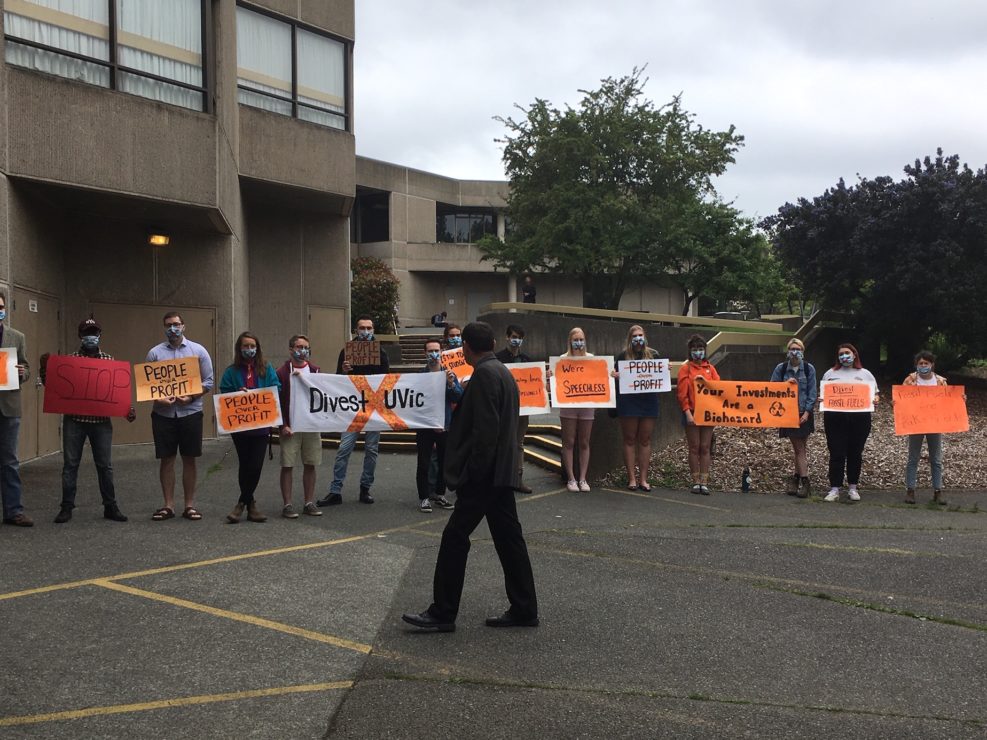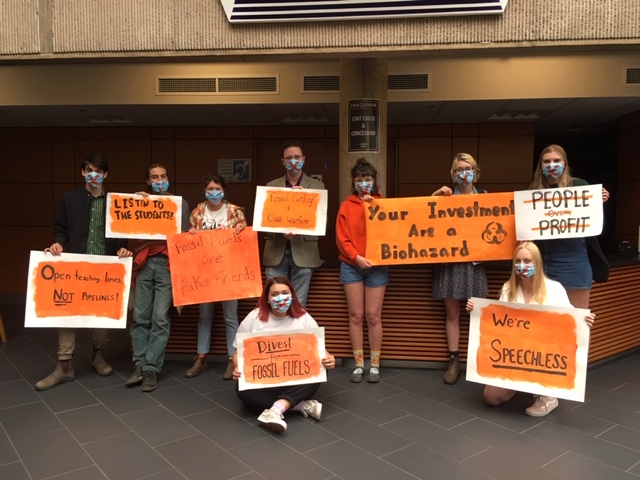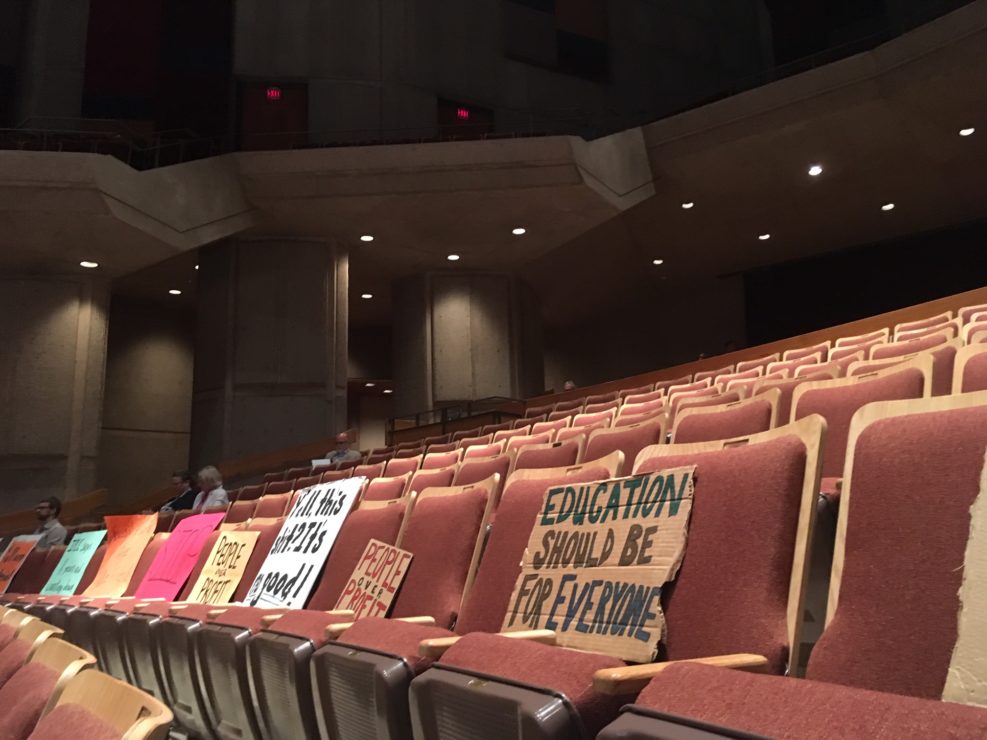Student protesters were left unsatisfied by the university’s response to divestment, international student tuition concerns

A crowd of students stood outside of the Farquhar Auditorium shortly before 11 a.m. on May 28, wearing blue surgical masks marked with a bold orange letter “X” covering their mouths. Each carried a different hand-painted sign, with messages including “Your investments are a biohazard,” “Fossil funding is class warfare,” “People over profit,” “Fossil fuels are fake friends,” and “STOP.”
The UVic Board of Governors (BoG) approached the silent protesters, most glancing briefly at the signs before passing into the back door of the auditorium to take their places for the meeting about to begin. But Jamie Cassels, President of UVic, broke from the crowd.
Alone, Cassels stood before the protesters, taking in their signs. After a pause, the university president turned away and entered the building.
This near-exchange was emblematic of the BoG meeting that day — charged, brief, and ultimately unsatisfying for many who were in attendance.
Over a dozen students were there to protest the university’s continued investments in fossil fuels. Students, including many members of the student group Divest UVic, filed a 24-page report to the BoG requesting UVic divest from fossil fuels within the next three years, and a response was anticipated to be issued by the board at the meeting.

“We are in the midst of a climate crisis. There is no time to debate this simple scientific fact,” the introduction to the report says. “Now, we must listen to the scientific evidence and drastically shift our economic, social and financial systems to do everything we can to combat the gravest threat facing our present and future.”
The previous BoG meeting in March also drew protesters, in greater numbers and volume. An estimated crowd of between 100 and 200 people rallied against the proposed 2019-2020 budget, which included a 15 per cent tuition raise for incoming international undergraduate students — the third notable increase of fees for international students in three years.
The March meeting was brought to an early conclusion due to the raucous crowd, and the board reconvened shortly after in a closed meeting at the Michael Williams building to pass the budget. In protest of the board’s response, students staged an overnight sit-in at the Senate Chambers.
In contrast, there were only about 25 people in attendance at the May meeting. The board moved quickly through the agenda, starting first with the much-anticipated review of correspondence.
The first letter came from a student, who addressed concern over the university’s response to requests that UVic publicly support the Unist’ot’en camp. The board responded that UVic is in direct contact with the NSU over those requests, and a response was sent to the student.
However, as with many of their answers that day, the board did not specify what exactly was said in that response.
“We were there to listen today, [although] there wasn’t much to listen to, unfortunately,” said Watts. “Next time, we might have more to say.”
A community member submitted a letter regarding the increase in international tuition fees approved by the board in their 2019-2020 budget. Again, the BoG said that a response had been sent, but did not specify what they had said.
Another letter was from a group of students concerned about the increased international fees, divestment, responsible investing, and student engagement and representation. The board said they had discussed the letter, which had implored them to implement change on several fronts, but ultimately did not issue a stance on any of the students’ demands.
“The university is committed to attracting, supporting, and developing a diverse group of students,” said a spokesperson for the BoG. “The board will continue to engage management in discussions regarding international tuition fees and support for international students at both the graduate and undergraduate level … Management is actively engaged in discussions with students regarding responsible investment.”
The BoG also mentioned that they received the report from Divest UVic, and 11 letters from faculty members regarding administrative initiatives. The BoG again said they had prepared and sent responses to each of these messages.
After the correspondence, the BoG had a few things left to discuss — particularly, the various accolades the university has received recently.
UVic was one of 10 universities in Canada that met standards of academic diversity. The campus cycling plan, released just a few months ago, won the 2019 Planning Award from the Canadian Institute of Planners. They also received an award from United Way, due to the funding contributions the university has made over the past year.
Finally, there was an update from the finance committee on responsible investment. The BoG received input from Divest UVic, and looked at what other universities have done in regards to divestment.
“The committee is committed to opening dialogue with the [UVic] Foundation,” said Beverly Van Ruyven, in regards to divestment.
And with that, the meeting was over — just under 30 minutes after it had begun.

“That’s the public portion of the meeting?” said Juliet Watts, UVSS Director of Campaigns and Community Relations and one of the protesters. “They didn’t even say anything.”
After the meeting, Watts expressed her disappointment with the lack of transparency she felt the BoG conveyed in the meeting. She is currently involved in a working group that’s exploring the potential of divestment with UVic, but feels that the university has been fairly unreceptive to any of the student’s requests beyond lowering greenhouse gas emissions from their investments.
“My largest concerns with the working groups is that they’re gonna try to give us ‘little wins,’” Watts said, a term which she says was used by the university in previous meetings with her. “This was our first presence at a Board of Governors meeting, and it’s not gonna stop over the course of the year … it will continue until divestment happens.”
Watts foresees the presence of students at BoG meetings to increase, particularly in the fall when more students return to campus.
“I think it would be incredible to fill every seat in here, and to really show our Board of Governors that we are here to hold them accountable,” she said.
The point of that day’s protest was to draw a contrast to the March meeting, and Watts had hoped it would promote the board to speak more candidly about their opinions on divestment.
“We were there to listen today, [although] there wasn’t much to listen to, unfortunately,” said Watts. “Next time, we might have more to say.”
The next Board of Governors meeting will take place on June 25 at 11 a.m. You can find the Martlet’s live Twitter coverage of this meeting here.






